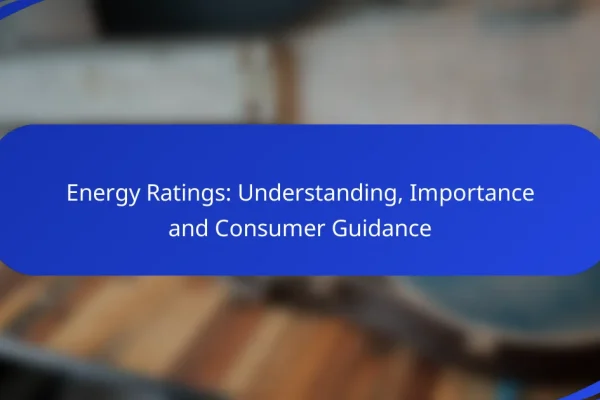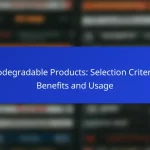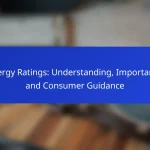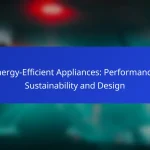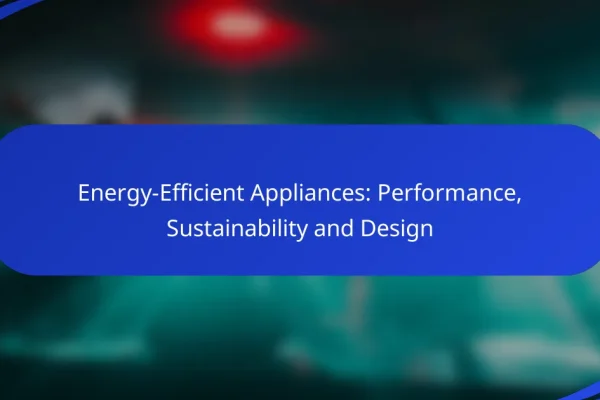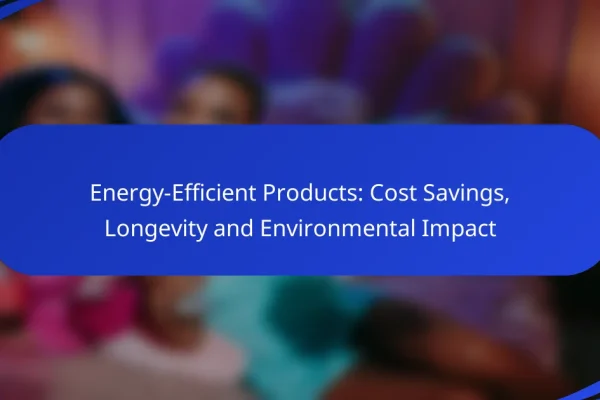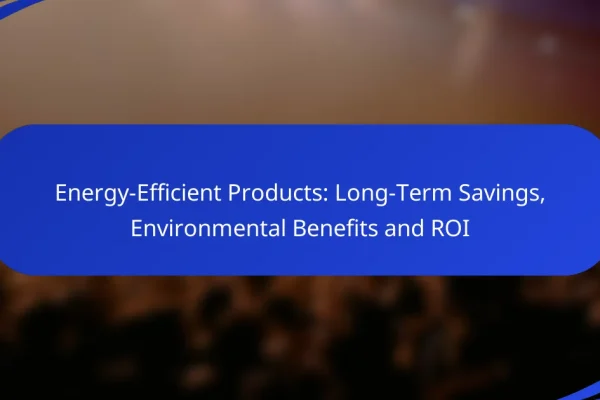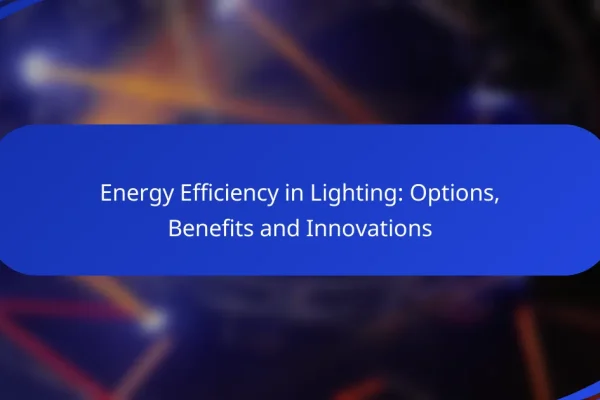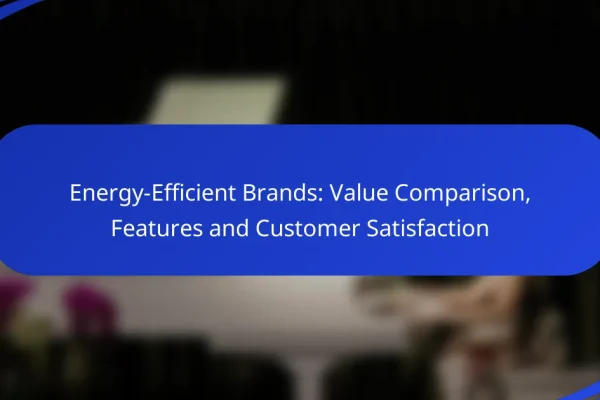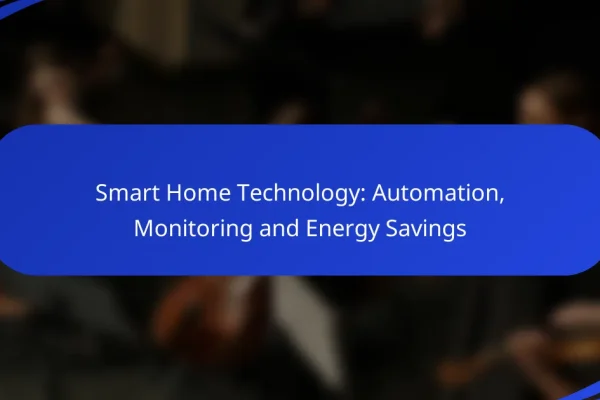How can I improve energy efficiency in my home?
Improving energy efficiency in your home can significantly reduce utility bills and environmental impact. Key strategies include upgrading appliances, enhancing insulation, utilizing smart technology, switching to LED lighting, and considering solar panel installation.
Energy-efficient appliances
Energy-efficient appliances consume less electricity and water compared to standard models, which can lead to substantial savings over time. Look for products with the ENERGY STAR label, which indicates compliance with energy efficiency guidelines set by the U.S. Environmental Protection Agency.
When replacing appliances, consider their energy consumption ratings and operational costs. For example, an energy-efficient refrigerator can save you around 100 USD annually compared to older models.
Insulation upgrades
Upgrading insulation in your home helps maintain temperature, reducing the need for heating and cooling. Focus on areas like attics, walls, and basements, where heat loss is most significant.
Consider materials such as fiberglass, foam, or cellulose, each with different R-values indicating their effectiveness. A well-insulated home can save you 10-50% on heating and cooling costs.
Smart thermostats
Smart thermostats allow for precise temperature control and can learn your schedule to optimize energy use. They can reduce heating and cooling costs by adjusting settings when you are away or asleep.
Many models can be controlled remotely via smartphone apps, providing convenience and further savings. Installing a smart thermostat can lead to energy savings of about 10-20% on your heating and cooling bills.
LED lighting
Switching to LED lighting is one of the simplest ways to improve energy efficiency. LEDs use up to 80% less energy than traditional incandescent bulbs and last significantly longer, reducing replacement costs.
Consider replacing all light fixtures with LED options, as they can save you approximately 100 USD or more in energy costs over their lifetime. Look for bulbs with a high lumen output and low wattage for maximum efficiency.
Solar panel installation
Installing solar panels can drastically reduce your reliance on grid electricity, leading to lower energy bills. The initial investment can be offset by tax credits and long-term savings on energy costs.
Evaluate your roof’s orientation and shading to determine the potential for solar energy generation. Many homeowners see a return on investment within 5-10 years, depending on local incentives and energy prices.
What are the benefits of energy efficiency?
Energy efficiency offers numerous advantages, including lower utility costs, reduced environmental impact, and increased property value. By optimizing energy use, individuals and businesses can save money while contributing to a more sustainable future.
Cost savings on utility bills
Implementing energy-efficient practices can significantly lower utility bills. For instance, upgrading to LED lighting or high-efficiency appliances can reduce energy consumption by 20-30%. Homeowners and businesses should consider conducting an energy audit to identify areas for improvement.
Simple actions, such as sealing leaks in windows and doors or using programmable thermostats, can lead to substantial savings over time. Regular maintenance of heating and cooling systems also ensures they operate efficiently, further cutting costs.
Reduced carbon footprint
Energy efficiency directly contributes to a smaller carbon footprint by minimizing energy consumption and reliance on fossil fuels. For example, using energy-efficient appliances can reduce greenhouse gas emissions by a significant margin, often in the range of hundreds of kilograms per year.
Switching to renewable energy sources, such as solar or wind, in conjunction with energy-efficient practices amplifies this effect. Communities can benefit from initiatives that promote energy efficiency, leading to cleaner air and a healthier environment.
Increased property value
Properties that are energy-efficient often have higher market values. Buyers are increasingly looking for homes with energy-saving features, which can lead to a premium on the sale price. Investing in energy-efficient upgrades can yield returns of 70-90% at resale.
Additionally, energy-efficient homes typically sell faster than their less efficient counterparts. Features such as Energy Star ratings or certifications can enhance a property’s appeal, making it a smart investment for homeowners looking to increase value.
What are the best energy-efficient products?
The best energy-efficient products include appliances, HVAC systems, and smart devices that significantly reduce energy consumption while maintaining performance. These products not only lower utility bills but also contribute to environmental sustainability.
Energy Star certified appliances
Energy Star certified appliances meet strict efficiency guidelines set by the U.S. Environmental Protection Agency. These products use about 10-50% less energy compared to standard models, which can lead to substantial savings on energy bills over time.
When selecting Energy Star appliances, consider factors like size and features that match your needs. Look for refrigerators, washing machines, and dishwashers that carry the Energy Star label to ensure optimal efficiency.
High-efficiency HVAC systems
High-efficiency HVAC systems are designed to use less energy while providing effective heating and cooling. These systems often have a Seasonal Energy Efficiency Ratio (SEER) rating of 15 or higher, which indicates better performance and lower energy costs.
Investing in a high-efficiency HVAC system can reduce energy bills by 20-30%. Regular maintenance, such as changing filters and scheduling annual check-ups, is essential to keep these systems running efficiently.
Smart home devices
Smart home devices, like thermostats and lighting systems, allow for better energy management through automation and remote control. These devices can learn your habits and adjust settings to optimize energy use, potentially saving up to 10-15% on energy costs.
When choosing smart devices, look for compatibility with existing systems and ease of use. Features like scheduling, geofencing, and energy usage reports can help you make informed decisions about your energy consumption.
How does energy efficiency impact the environment?
Energy efficiency significantly reduces the environmental footprint by minimizing energy consumption and lowering greenhouse gas emissions. By using less energy to perform the same tasks, we can mitigate climate change and preserve natural resources.
Lower greenhouse gas emissions
Improving energy efficiency directly leads to lower greenhouse gas emissions, as less energy consumption means reduced reliance on fossil fuels. For instance, energy-efficient appliances and vehicles consume less power, resulting in fewer emissions during energy production.
Switching to energy-efficient technologies can cut emissions by a substantial margin, often in the range of 20-50%. This reduction contributes to cleaner air and a healthier environment, which benefits both ecosystems and human health.
Conservation of natural resources
Energy efficiency plays a crucial role in conserving natural resources by reducing the demand for energy production. This decrease in demand helps preserve finite resources such as coal, oil, and natural gas, which are often extracted through environmentally damaging processes.
For example, using energy-efficient lighting can significantly lower electricity consumption, which in turn reduces the need for coal-fired power plants. This conservation effort not only helps maintain resource availability but also minimizes habitat destruction and water usage associated with energy extraction and production.
What are the government incentives for energy efficiency?
Government incentives for energy efficiency include various financial programs designed to encourage homeowners and businesses to invest in energy-saving upgrades. These incentives often come in the form of tax credits and utility rebates, making energy-efficient choices more affordable.
Tax credits for energy-efficient upgrades
Tax credits for energy-efficient upgrades reduce the amount of income tax owed by individuals or businesses that invest in qualifying improvements. Common upgrades include solar panels, energy-efficient windows, and high-efficiency heating and cooling systems.
In the United States, for example, homeowners may receive a tax credit of up to 30% of the cost for solar energy systems installed before a certain deadline. Always check the current regulations, as these credits can change annually.
Utility rebates for energy-saving products
Utility rebates are financial incentives offered by local utility companies to encourage the purchase of energy-efficient appliances and systems. These rebates can significantly lower the upfront costs of items like ENERGY STAR-rated refrigerators, washing machines, and smart thermostats.
Rebate amounts vary by utility provider and product type, often ranging from $50 to several hundred dollars. To take advantage of these offers, consumers should verify eligibility requirements and application processes through their utility company’s website.
